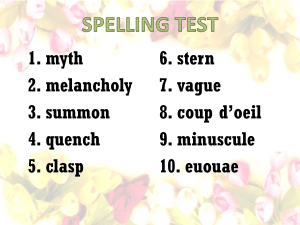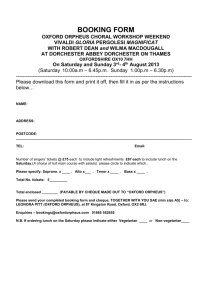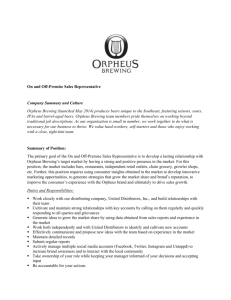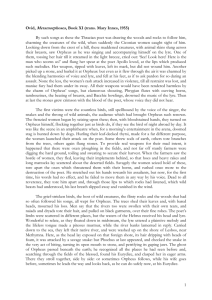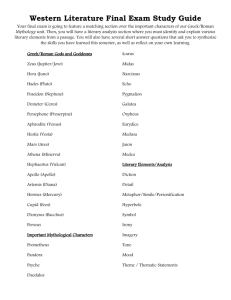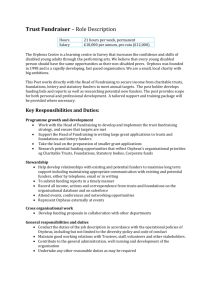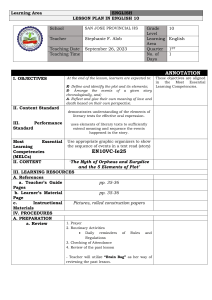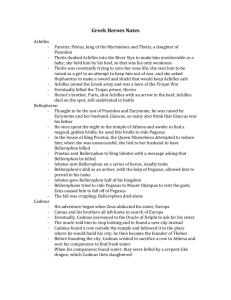Word - In Memoriam C.3.3.
advertisement
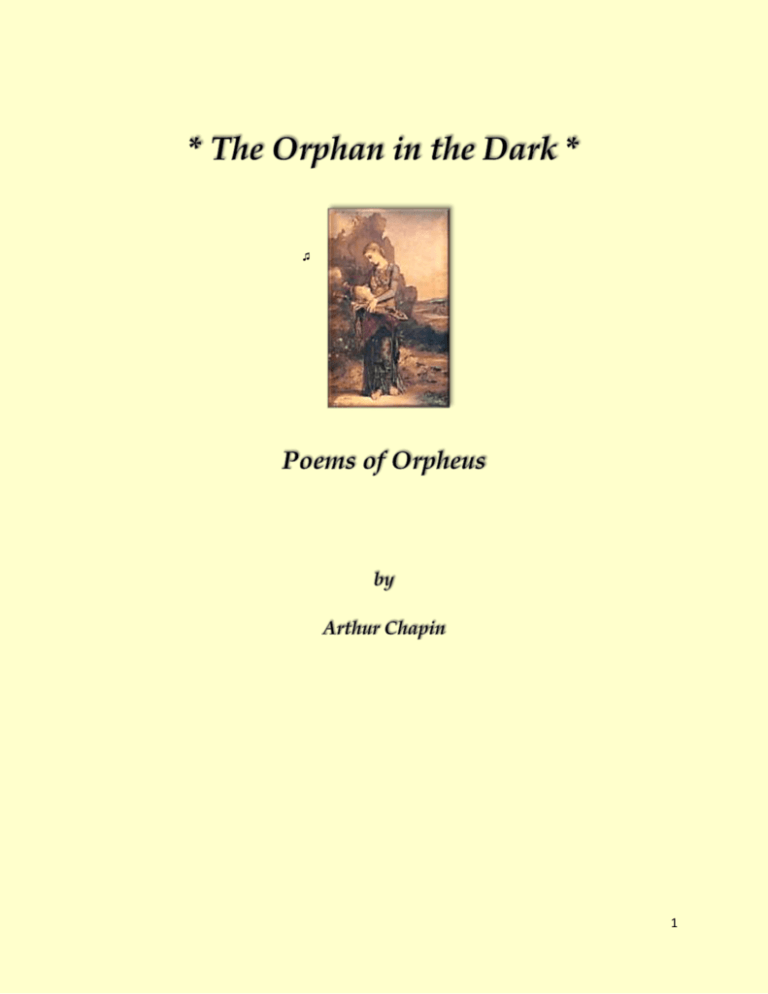
♫ 1 I am the body of elegy Shot through with little lyric wounds. I am the way the music sounds When love bleeds in its native key. ♫ 2 Table of Contents The Orphan in the Dark 4 The Sacrament of Song The Young Thracian Instant Myth 5 6 7 Hermes Psychopompos: Shepherd of the Dead His Grand Recital on the Harp Orpheus in the City of Dis Orpheus Insufferable Eurydice Incensed Rilke: Credo 8 9 11 12 13 14 Rilke: Château de Muzot, 1922 Traveler’s Round 15 16 Orpheus and the River of Glass 18 Head of Orpheus on the Water 21 Passing Through Musical Appendix 22 23 3 The Orphan in the Dark Who am I? Open up the book. I am the orphan in the dark Lamenting, cupping my one spark. How could I help but turn and look? Eurydice, breathes through the cave. An echo. A hiss. I grope my way Back up into the light of day. There, in the meadow, is her grave. There, the immortal snake that bit her Days, weeks, or was it years ago? Eurydice, whispers the low Wind in the grass, so cool, so bitter. I lay flowers on her grave, and then I rest. I look up at the sky. I sleep, till I hear the wind sigh: It is time to go down again. ♫ 4 The Sacrament of Song In the woods, in the forest of My music, ancient animals Move. I coax from their cries and calls The hidden harmony I love: The active quiet of bees humming, The rest that is the heaving, grave Sleep of the bear inside his cave, Those little feet on leaves snare-drumming… These creatures, ignorant and strong: I lure them from their shrieks and howls Through measured consonants and vowels Into the sacrament of song. I build long staves across their listening Haunted by owls that dream of trees That dream of owls. I fill the breeze With little eighth-notes, blackly glistening. I make a clearing for the moon To see alive the struggling wood In motives snarled, and call it good, Because it lives inside a tune. They are still wild as wind and fire. The fang gleams, and the eyes glow red. But with my music they are fed. They quiver when I touch my lyre. 5 The Young Thracian This is the burden of the song That is the poem Orpheus, The poem of Orpheus. What it does It is. In darkness it is strong. O red-haired, beautiful young Thracian, You harrow with such gentle shocks Of sound, you levitate the rocks In metamorphic trance-formation! 6 Instant Myth Running through the meadow she startles a snake and in a lightning-strike he comes out of the cave eyes black with the dazzle of her vanishing. 7 Hermes Psychopompos Shepherd of the Dead Cover her eyes. Steal past the dead—their souls Are still awake—she must not see them—no, Not yet… They are so weak, their shadows throw Them on the walls, they have the eyes of moles. Follow that winding strip—that frozen whirl— Down to where magma forms a bubbling sod. Let her trust gravity: it serves the god. He dwells down there. That heavy heart… Poor girl. Is that a distant echo? Daughter, daughter! Now on her cheek she thinks she feels a breath. Come, I will bathe you in the cool, still water. It walks beside her now. Her heart is sad. Oh Open her eyes, god, she must see the Shadow! It reaches out for her. It is her death.! 8 His Grand Recital on the Harp It is your audience with the King. No one alive has seen Hades But you. Play him your melodies. Let there be no more vanishing! One long, thin finger seems to wear A ring of smoldering almandine. His crown is a penumbra. Fine Bone-powder whitens his gray hair. His throne? A sort of solid smoke. Next to him: Queen Persephone. Her face is chiseled ebony. She is wrapped in a shadow-cloak. How shall your music charm this Head That is a pale cloud in the darkness Around you? Glooms of rocky starkness Speak Death. His ring glows Hell-fire red. Evoke for him the Revelry, The dancing of young, nimble feet, A blue sky and the summer’s heat Fanned by a soft breeze from the sea. That glimmering figment of a head Is bowed, and down it seems to sink In thoughts it swore it would not think Again. Memories of the dead 9 Meadows, green spots where once he dallied With nymphs long-gone, the fountains muddy Now… From the brown to the black study His heart is moved. His face is pallid. He would cry out, but, short of breath, He wheezes as he grants the boon: You, you will sing a different tune To see her die another death. ♫ 10 The City of Dis They’re waiting for you anywhere night vision's poor, swindles of perception, optical disillusionments. Dis: city of deprivatives, insults, assaults. A puncture is worth a thousand words. Retrofit your lyre with trigger and barrel. Walk fast, shoulders hunched looking crazy and mean. Ignore the blurt of a car horn, the squealing wheels, that gaseous burp wobbling the manhole cover on its rim, the down-and-outer in the cubbyhole sucking brain damage from a paper bag. Glide along the wall like moonlight. Good. Descend. (Should you go back the way you came, up the subway stairs?) Someone’s stepping out of the shadows. Look! She disappears. 11 Orpheus Insufferable They’re breathless with excitement! I live up To my distinguished reputation, filling Their ears with melos, brimming each dry cup. I am a touring star. I get top billing. One soft arpeggio… There they are, reliving Trysts under willow trees in summer’s heat. They weep, and (ah, the dead can be so giving!) They lay flowers—wilted flowers—at my feet. These are the scales I practice on the heart. Ghosts rise to meet the notes like grass in meadows: I mow straight through them with a keen C sharp. It is my Grand Recital on the Harp That wins the prize: The Emperor of Shadows Will pin her like a ribbon to my art. ♫ 12 Eurydice Incensed Having passed the shadowy audition with flying Coloratura singing and eloquent harping On themes so dear to the departed—Grieving In springtime—Death on the eve of the white wedding— Daguerreotypes of dazzled faces fading—giving Them ears composed of nothing but a listening— Leading me stumbling up a mineshaft twisting Toward that pin-hole radiance thronged with the living, You turn, and I am that startled vanishing You needed to sculpt a frieze of pure departing— A soft, defeated cry stonily echoing Into the tragic poem of your regretting It wasn’t to see my face—Or to see me going— Or gone—It was to turn—It was the turning: ♫ 13 Rilke: Credo Let things felt be your credo, not mere feeling. Look, always look… Be calm with Pain and Pleasure: Your destiny is buttress, vault and ceiling. Squeeze into silence under massive pressure. Spread through these stained-glass shapes, be the still bliss In martyrs’ eyes when sunbeams bruise them; coil Your tumult deep inside the wafer’s kiss, The cool, chromatic sheen on chrism oil— Fling yourself out now, in convulsive waves, And find, in Orpheus, your mouth, your breath. Float down the river of a song no staves Can hold—the one whole note that rings through death And grows so vast and palpable and round Earth dwells entirely in that single sound. 14 Rilke: Château de Muzot, 1922 It ripens to its hour; I will be spent. I never knew that it would feel so light, This strength the Angel gives me. You were meant For this, he says. And I stand up and write. Hearts hinder, hearths hold back… Geese-haunted skies, O orphaned spaces shivering! Can a breath Husband the share of all departing cries, Bless each thing with the shape of its own death? My tower is vigil. Patience makes me rich. Let statesmen dig excuses from the rubble They made. They boast of peace. There will be trouble. America floods the emptiness with kitsch— But our dead still belong to us. Soon Europe Will taste its harvest: that dark, Orphic syrup. 15 Traveler’s Round First, source. Then river. Then the vast Salt sea. Sunlight and rain, halfway Between the earth and heaven, play A rainbow. Beauty cannot last. Born of an urge to tell us why It needed to be born, to mean The dawn, the poem becomes the scene In which the god begins to die. Beginning softly, the notes wend Their way to a climactic middle. Like the solution of a riddle They find a path to reach the end. Overture to the eternity Where changes end, the tune, nel mezzo, Learns it was always intermezzo And this is its finality. Open the curtains of the rose: There, at the center: the red heart. You hear a mournful music start; A voice sobs, and the curtains close. Prelude to noontide in the valley, Unscorched by the meridian, The earliest aubade is wan With thoughts of the long grey finale. 16 First sea, then river, across vast Distances traveling home. Halfway, A lake. Sunbeams on water play. The source, high in the hills, comes last. 17 The River of Glass 1. The river leaves so much behind. It cares not to recall its source. Would you reverse the river’s course? Then you must change the water’s mind. The water can be soothed, and hear The music that is Orpheus. Then it is vulnerable, thus You find the water’s inner ear. 2. The Moving Picture of the River Narcissus loves it as his mirror. His dream would be to glide along His beauty and hear its silent song Of praise. If he could but draw nearer! If only he could kiss his face, And not its image! But it slips Away, or twists its ghostly lips, A blurred and agitated trace. 3. The Frozen Picture of the Water Now comes the moment of arrest. A standing still, as of a glacier, When the calm water ever-glassier Congeals around the thought of rest. 18 A white opacity prevails. Narcissus cannot see his face. The mirror has become a place. Resemblance is a power that fails. He would not, but he shall stay put. The water is solid, a base metal. The screw is turning and the treadle Thumping beneath a heavy foot. Ghosts bent into the shape of a Question mark; others, gusts of wind. The ghastly little thing that grinned. The walking ghost that lost its way. The dervish ghost, his Dance of Death. How witches in the garden caught By witches’ globes bemoan their lot! The scryer of water underneath The water sees the angry dancer But cannot call him from a Sleep As restless as the sea is deep: He is the question, not the answer. Who am I? Asks the man. A ghost. Now the ghost knows it was a man. Narcissus from his bronze self can Be freed. I gather in the lost. 4. The river rages in its force. I give the water a key, a measure. The Song in all her steadying pressure Reaches down from her mountain source 19 And calls the river. Up she gathers The waters all into the song She is singing, It Will Not Be Long. The trees that guard her are the Fathers. 20 Head of Orpheus on the Water Be the note you sing. Echo of the rising waters. How the sea’s premonition sounds. Sing where you will be with the voice of where you were. Essential now, teach the water what the water is: a rashness lost and retrieved in the mirrors of its motion. Your voice is bodiless honey afloat on a buoyancy that is not hope. Become the river. Relax into your delta flats, develop your intricate metaphors for a vastness that swallows all qualities. After the final cadence your song will sleep in the arms of singing and the moon’s over the ocean O! 21 Passing Through I see an image, yes, it must Be Orpheus: He stands before A mirror, as upon a shore. He aims to charm the King of Dust. He passes through the liquid glass And down into the shadows goes Where echoes of an otiose Palaver of ghosts, Why? and Alas!, Play off the empty space where should Be walls of what is really nowhere. Come to me, husband! Lower and lower Past stream of blood and mournful wood. He has gone through the watery glass. The glassy waters barely wobble, They know so well by now the trouble Passing, how it will never pass. ♫ 22 Musical Selections Page 2 Fauré, Elegy. Gregor Piatigorsky, cello. Unnamed orchestra. Page 4 The Song of Seikilos. The Atrium Musicae de Madrid directed by Gregorio Paniagua. Page 10 Monteverdi, Orfeo, Act I. Lasciate i monti. English Baroque Soloists. John Eliot Gardiner, conductor. Coro di Ninfe e Pastori Lasciate i monti, Lasciate i fonti, Ninfe vezzose e liete E in questi prati Ai balli usati Vago il bel piè rendete. Qui miri il sole Vostre carole, Più vaghe assai di quelle Ond'alla luna, La notte bruna, Danzano in ciel le stelle. Ritornello Lasciate i monti, Lasciate i fonti, Ninfe vezzose e liete E in questi prati Ai balli usati Vago il bel piè rendete. Poi di bei fiori Per voi s'onori Di questi amanti il crine, Ch'or dei martiri Dei lor desiri Godon beati al fine. Chorus of Nymphs and Shepherds Come down from the hills, come down from the springs , Nymphs so comely and glad, and in these meadows in wonted dances let your fair feet rejoice. Here shall the sun behold your measures lovelier far than those danced to the moon in the dead of night by the stars in the sky. Ritornello Come down from the hills, come down from the springs , Nymphs so comely and glad, and in these meadows in wonted dances let your fair feet rejoice. Then with fair flowers crown the heads of these lovers, who after the torment of their longing. are happy at last. 23 Page 12 Monteverdi, Orfeo, Act II, Sinfonia: “Ecco pur ch’a voi ritorno.” English Baroque Soloists, John Eliot Gardiner, conductor. Orfeo: Ecco pur ch’a voi ritorno, Care selve e piagge amate, Da quel Sol fatte beate, Per cui sol mie notti han giorno. Orpheus: Here I return to you, Dear forests and beloved meadows, Blessed by that very Sun Through whom alone my nights are day. Trans. Gilbert Blin Page 13 Gluck, Orfeo ed Euridice, Act II, Scene I: “Dance of the Furies.” Choir and Orchestra of the Vienna State Opera, Sir Charles Mackerras, conductor. Page 22 Gluck, Orfeo ed Euridice. Act II, Scene I: Quest’ asilo. Choir and Orchestra of the Vienna State Opera, Sir Charles Mackerras, conductor. Eurydice and Chorus: E’ quest’ asilo ameno e grato del riposo il terren, è il soggiorno ridente beato del sommo ben; non ingombra l’alma sicura pura, l’aura tranquilla gira, spira la calma piacere nel sen; e dell’anima il dolore muore fuggendo il casto terren! These fields are a haven of lovely and grateful rest, here repose the blithe spirits blessed by the highest good, tranquil breezes play, passions are quieted in the soul, and all grief dies, fleeing from the undefiled terrain. Trans. Charles Harmon 24
